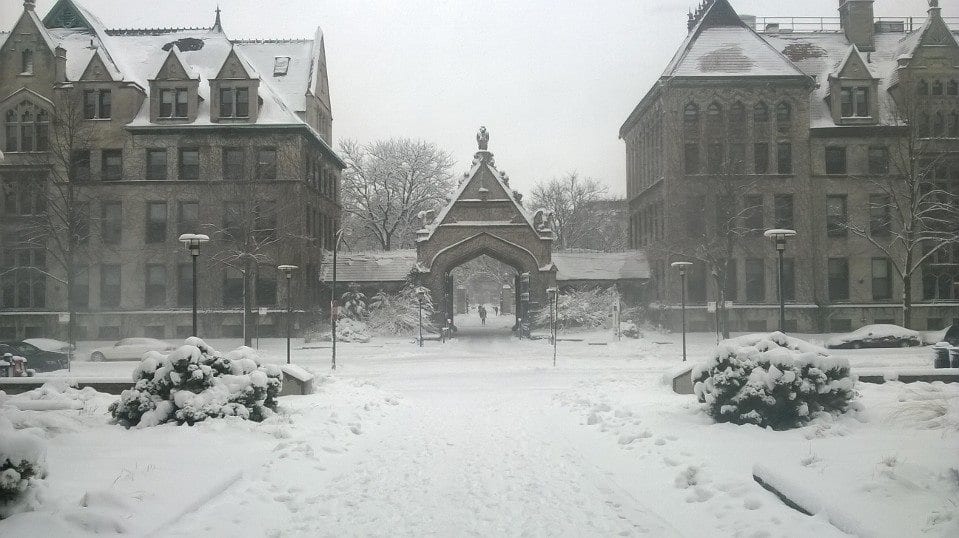I’m writing this post from our campus library. Right now, things are quiet – it’s Saturday morning after all. This is a far cry from what it will be like during finals week, as the tables and carrels are packed with students cramming for their exams. The calm today is welcoming.
This is actually one of the few times I’ve been to the library so far this year (2018). I work from home a lot, and I’m not teaching this quarter so I have fewer reasons to be on campus anyway. From home I can use the notes I’ve already compiled, sources available online, and, yes, books I’ve checked out from the library. Still, it feels odd to spend so little time in a place undoubtedly at the center of my individual and communal (intellectual) life.
Equally surprising is how infrequently I’ve referred to my university’s library in this blog. The closest it’s come to center stage is ironically a post I wrote before leaving for China, whose conceit was the graduate student’s ritual returning of (unread) books before a trip. Maybe I haven’t given the library its due because it embodies the intersection of the mundane and highly specialized nature of my work as a graduate student. But maybe it’s time.

The view looking south onto campus from the front steps of Regenstein Library (2/1/15)
Last Friday morning I organized an event on campus. It was bitterly cold. Only a couple people came. There was a book I wanted to check out from the library, so I stopped by on my way back home. It was not one of the library’s busier days, but compared to the deserted campus pathways outside, it was practically bustling.
Almost immediately on passing through the gates I ran into a classmate who I hadn’t seen in the new year. He had just finished teaching his first discussion section of the quarter. It was good to see him and hear his class had gone well. As we parted and I headed toward the stairs, I encountered another friend who works at the library. We had just seen each other the night before, but I was able to relay that another friend had failed to appreciate the economic and comedic genius of a plan we had hatched involving singing candles/holders.
My first destination was the B level of the basement. Having to retrieve a book from the social sciences stacks down there irks me. The second floor is the proper domain for a historian, while the fifth floor houses our East Asia collection. The basement is at best a distant third in my hierarchy of library stacks.
On the way, I realized that I should probably check out the next book on another of my reading lists too. I couldn’t remember what it was, much less the call number, so I seated myself at one of the computers, checked my list, and punched the book title (Inscribed Landscapes, if you’re curious) into the library’s online catalog. To my initial confusion, the first result was for a different book with the same title. I looked at the abstract and table of contents and realized it was something I might want to read. I added it to my list, sighing at the futility of hoping this list of things to read would ever shrink.
Scrolling down the results page, I found the book I had originally wanted. I noticed there was an electronic version. I could have accessed this book from home, but I was at the library anyway, and I much prefer paper versions. Its call number told me it was on the second floor. If there’s anything more irksome than having to go down to the basement in the first place, it’s having to double back, wondering all the while how two books being used for the same dissertation chapter could wind up so many floors apart. Soothing my inner rage, I saved myself some exercise by taking the elevator. Finding my target book, I cursed the author. 580 pages. Not what I needed, or, at least, much more than what I needed. My opinion of the author changed quickly as I flipped through the pages. When I put this book on my reading list eons ago, I probably knew that it was mostly a translation of primary texts and that what I really wanted to read was the introduction. I had long since forgotten. Bless you, Richard Strassberg.
So I returned to the ground floor, fumbling my library card out of my pocket and into the hands of the circulation desk attendant. And I was on my way back home.
In some ways graduate students’ perceptions of the library epitomize how we see life in academia in general. It is isolating. It is harsh. It is focused. However, our experiences here are much more multi-faceted than this. It is a space of encounter with people and ideas, both planned and otherwise. It is both a symbol of the vastness of human knowledge and a tool for acquiring it. But it is also a reminder of the finite nature of my own knowledge about the world and the time I have to acquire more. The library stacks invite leisurely perusal even as they goad me, the would-be reader, to move quickly because the list of things to read is only growing longer.